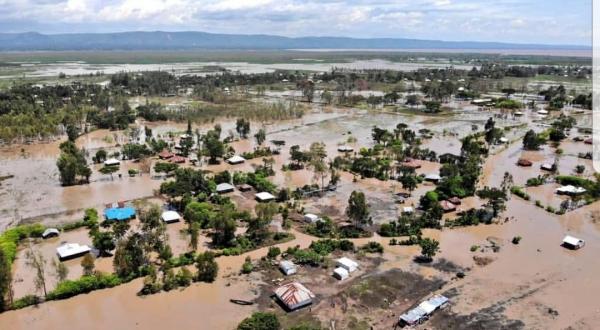Green Climate Fund's race against time for water security
23 Nov 2023 by The Water Diplomat

In September 2023 the Green Climate Fund (GCF) published the outlines of its water sector strategy under the heading “Running dry: racing against time to secure our water future”. This follows its publication last year of the draft sectoral guide for water. Water security is central to the activities of the GCF: it has currently mobilized U.S. $ 2.8 billion to water security across 38 projects in 58 countries. In addition, some 51% of its water projects are devoted to water security. Within this 51%, 17% of projects are dedicated to agriculture and food security, 9 % to ecosystems and ecosystem services, and 7 % to early warning and early actions. The remaining 18 % are dedicated to energy, infrastructure, health, and wellbeing initiatives.
The Green Climate Fund (GCF) recognises the urgent need for a comprehensive, innovative approach to water security. It notes that collectively, we are falling short of achieving the 2030 targets related to climate, sustainable development, and disaster risk reduction, and points out that this is especially evident in water resources management, which is a top priority sector in National Adaptation Plans (NAPs) and other regional adaptation policies. Building on the outcomes of the UN 2023 water conference, the Green Climate Fund recognises the profound and complex challenges climate change poses for global water security, such as increased scarcity, flooding, contamination, infrastructure damage, ecosystem disruption, and potential transboundary conflicts. These challenges have associated risks to public utilities, corporations and financial institutions which can disrupt operations, increase costs and potentially cause major financial losses.
Overcoming these interconnected challenges, the GCF states, will take bold commitments with innovative solutions, clear and measurable targets, institutional and policy reforms, dedicated financing, and cross-border collaboration. Amongst others, addressing these risks involves investment in weather, water, ocean, and climate sciences, which have seen revolutionary advancements in recent decades. However, significant challenges remain, such as gaps in global surface data, lack of accessibility for local communities, and insufficient scientific capacity prevent their full and effective use.
Water risks in an era of climate change involve complex interactions which are interconnected and systematic. As a result, the GCF recognizes the need for a comprehensive, innovative approach to water security that embraces this complexity. For the GCF, an appropriate response to strengthen water security for climate resilience requires a flexible and needs-based approach to projects which uses a nexus and integrated approach. The GCF invests in water security through different pathways which include water conservation, efficiency, and reuse, hydrological observation, forecasting and risk, assessment, integrated water management and SDG targets, climate resilient WASH and community knowledge. Within this spectrum of activity, the GCF underlines that although most current climate finance goes to mitigation projects, the mitigation potential of water remains largely neglected (e.g., wetland restoration and conservation). Therefore, this presents an opportunity to scale up efforts and align financing flows across different categories such as biodiversity, water management, and carbon credits. Additionally, GCF promotes sustainable water management practices that conserve resources and protect ecosystems. It supports projects that enhance community adaptive capacity, particularly for those most vulnerable to climate change.
At the level of financing, it also requires an innovative approach, viewing water as an asset class. The GCF leverages public and private investments to mobilise resources for water security and blending grants with innovative financial instruments such as water bonds, ‘catastrophe bonds’ (a debt instrument designed to raise money for companies in the event of a disaster), debt for climate swaps, etc.
To accelerate the achievement of the 2030 targets related to climate, sustainable development, and disaster risk reduction, the GCF lists six sets of actions that are needed. The first of these is increased investment in weather, water, ocean, and climate sciences to address the challenges posed by climate change and risk informed early warning systems. The second is harnessing private finance and exploring non-traditional financial instruments like equity investments, insurance, debt-swap and guarantees. Thirdly, the GCF is working to align investments for water security with climate action to create new financing opportunities for private sector linking to public sector or SMEs. Fourth, is is important to recognise the potential of water as a tool for mitigating climate change and scaling up efforts accordingly. Fifth, it advocates the promotion of sustainable water management practices that conserve water resources and protect ecosystems. And lastly, the GCF works to support projects that enhance the adaptive capacity of communities most vulnerable to climate change.
In a conversation The Water Diplomat, Bapon Fakhruddin, a water and climate leader at the GCF, highlighted a recent transition in the approach of the GCF to reviewing project proposals. Whereas in the early stages, the GCF had a ‘post-box’ approach to proposals, whereby the proposal was judged on its merits and based on the initiative of the submitting government or agency, it has over time developed sufficient expertise in the water sector to engage in co-production of projects. This implies that experiences from projects around the world can be shared with submitting entities as examples of alternative options to enrich the project concept under development, and benefit from the gradual buildup of global experience in investing in water security in a holistic and integrated manner.
On the 11th of December at COP 28, together with the French Water Partnership and the Global Water Partnership, the GCF is co-curating the agenda of a day on Transformative Climate Finance at the Water Pavilion.
